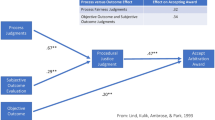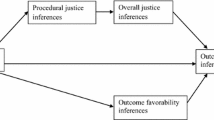Abstract
In social psychology it has been argued that the importance of justice cannot be overstated. In the present paper, we ask whether this indeed is the case and, more precisely, examine when fairness is an important determinant of human reactions and when it is less significant. To this end we explore what drives people's reactions to perceived fairness and argue that although social justice research has reported effects of fairness perceptions on people's affective feelings, a close examination of the literature shows that these reactions appear less frequently and less strong than one would expect. It is proposed here that this has to do with the neglect in the social psychology of justice of an important determinant of affective reactions: individuals' propensity to react strongly or mildly toward affect-related events. As hypothesized, findings of two empirical studies show that especially people high in affect intensity show strong affective reactions following the experience of outcome fairness (Study1) and procedural fairness (Study2). When affect intensity is low, however, weak or no fairness effects were found, suggesting that then fairness may not be an important issue. In the discussion it is thus argued that incorporating affect intensity into the justice literature may further insights into the psychology of reactions toward fairness.
Similar content being viewed by others
REFERENCES
Adams, J. S. (1965). Inequity in social exchange. In: Berkowitz, L. (ed.), Advances in Experimental Social Psychology (Vol. 2), Academic Press, New York, pp. 267-299.
Aiken, L. S., and West, S. G. (1991). Multiple Regression: Testing and Interpreting Interactions, Sage, Newbury Park, CA.
Brockner, J., and Wiesenfeld, B. M. (1996). An integrative framework for explaining reactions to decisions: Interactive effects of outcomes and procedures. Psychol. Bull. 120: 189-208.
Brockner, J., Grover, S., Reed, T., DeWitt, R., and O'Malley, M. (1987). Survivors reactions to layoffs: We get by with a little help from our friends. Adm. Sci. Q. 32: 526-541.
Brockner, J., Heuer, L., Siegel, P. A., Wiesenfeld, B., Martin, C., Grover, S., et al. (1998). The moderating effect of self-esteem in reaction to voice: Converging evidence from five studies. J. Pers. Soc. Psychol. 75: 394-407.
Cropanzano, R., and Greenberg, J. (1997). Progress in organizational justice: Tunneling through the maze. In: Cooper, C. L., and Robertson, I. T. (eds.), International Review of Industrial and Organizational Psychology, Wiley, New York, pp. 317-372.
Cropanzano, R., Weiss, H. M., Suckow, K., and Grandey, A. A. (2000). Doing justice to workplace emo-tions. In: Ashkanasy, N., Hartel, C., and Zerbe, W. (eds.), Emotions at Work, Quorum, Westport, CT, pp. 49-62.
Crosby, F. (1976). A model of egoistical relative deprivation. Psychol. Rev. 83: 85-112.
Diener, E., Larsen, R. J., Levine, S., and Emmons, R. A. (1985). Intensity and frequency: Dimensions underlying positive and negative affect. J. Pers. Soc. Psychol. 48: 1253-1265.
Doosje, B., Branscombe, N. R., Spears, R., and Manstead, A. S. R. (1998). Guilty by association: When one's group has a negative history. J. Pers. Soc. Psychol. 75: 872-886.
Folger, R. (1977). Distributive and procedural justice: Combined impact of “voice” and improvement of experienced inequity. J. Pers. Soc. Psychol. 35: 108-119.
Folger, R. (ed.) (1984). The Sense of Injustice: Social Psychological Perspectives, Plenum, New York.
Folger, R., and Baron, R. A. (1996). Violence and hostility at work: A model of reactions to perceived injustice. In: Vanden Bos, G. R., and Bulatao, E. Q. (eds.), Violence on the Job: Identifying Risks and Developing Solutions, American Psychological Association, Washington, DC, pp. 51-85.
Folger, R., and Cropanzano, R. (1998). Organizational Justice and Human Resource Management, Sage, Thousand Oaks, CA.
Folger, R., and Konovsky, M. (1989). Effects of procedural and distributive justice on reactions to pay raise decisions. Acad. Manage. J. 32: 115-130.
Folger, R., and Skarlicki, D. P. (1998). When tough times make tough bosses: Managerial distancing as a function of layoff blame. Acad. Manage. J. 41: 79-87.
Folger, R., Rosenfield, D., Grove, J., and Corkran, L. (1979). Effects of “voice” and peer opinions on responses to inequity. J. Pers. Soc. Psychol. 37: 2253-2261.
Folger, R., Robinson, S. L., Dietz, J., Baron, R. A., and McLean-Parks, J. (2001). When Colleagues Become Violent: Employee Threats and Assaults as a Function of Societal Violence and Organizational Injustice, Manuscript submitted for publication.
Frijda, N. H. (1988). The laws of emotion. Am. Psychol. 4: 349-358.
Greenberg, J. (1993). Stealing in the name of justice: Informational and interpersonal moderators of theft reactions to underpayment inequity. Organ. Behav. Hum. Decis. Process. 54: 81-103.
Greenberg, J. (1997). A social influence model of employee theft: Beyond the fraud triangle. In: Lewicki, R. J., Bies, R. J., and Sheppard, B. H. (eds.), Research on Negotiation in Organizations (Vol. 6), JAI Press, Greenwich, CT, pp. 29-52.
Greenberg, J., and Lind, E. A. (2000). The pursuit of organizational justice: From conceptualization to implication to application. In: Cooper, C. L., and Locke, E. A. (eds.), I/O Psychology: What We Know About Theory and Practice, Blackwell, Oxford, England, pp. 72-105.
Gross, J. J. (1998). The emerging field of emotion regulation: An integrative review. Rev. Gen. Psychol. 3: 271-299.
Haidt, J. (2001). The emotional dog and its rational tail: Asocial intuitionist approach to moral judgment. Psychol. Rev. 108: 814-834.
Haidt, J. (2003). The moral emotions. In: Davidson, R. J., Scherer, K., and Goldsmith, H. H. (eds.), Handbook of Affective Sciences, Oxford University Press, Oxford, UK, pp. 852-870.
Korsgaard, M. A., Schweiger, D. M., and Sapienza, H. J. (1995). Building commitment, attachment, and trust in strategic decision-making teams: The role of procedural justice. Acad. Manage. J. 38: 60-84.
Krehbiel, P. J., and Cropanzano, R. (2000). Procedural justice, outcome favorability and emotion. Soc. Justice Res. 13: 339-360.
Larsen, R. J., and Diener, E. (1987). Affect intensity as an individual difference characteristic: Areview. J. Res. Pers. 21: 1-39.
Larsen, R. J., Diener, E., and Emmons, R. (1986). Affect intensity and reactions to daily life events. J. Pers. Soc. Psychol. 51: 803-814.
Larsen, R. J., Diener, E., and Cropanzano, R. S. (1987). Cognitive operations associated with individual differences in affect intensity. J. Pers. Soc. Psychol. 53: 767-774.
Lind, E. A., and Tyler, T. R. (1988). The Social Psychology of Procedural Justice, Plenum, New York.
Lind, E. A., and Van den Bos, K. (2002). When fairness works: Toward a general theory of uncertainty management. In: Staw, B. M., and Kramer, R. M. (eds.), Research in Organizational Behavior (Vol. 24), JAI Press, Greenwich, CT, pp. 181-223.
Lind, E. A., Kanfer, R., and Earley, P. C. (1990). Voice, control, and procedural justice: Instrumental and noninstrumental concerns in fairness judgments. J. Pers. Soc. Psychol. 59: 952-959.
McFarlin, D. B., and Sweeney, P. D. (1992). Distributive and procedural justice as predictors of satisfaction with personal and organizational outcomes. Acad. Manage. J. 35: 626-637.
Mikula, G., Scherer, K. R., and Athenstaedt, U. (1998). The role of injustice in the elicitation of differential emotional reactions. Pers. Soc. Psychol. Bull. 24: 769-783.
Mischel, W. (1973). Toward a cognitive social learning reconceptualization of personality. Psychol. Rev. 80: 252-283.
Montada, L., and Schneider, A. (1989). Justice and emotional reactions to the disadvantaged. Soc. Justice Res. 10: 333-353.
Mook, D. G. (1983). In defense of external invalidity. Am. Psychol. 38: 379-387.
Rozin, P., Lowery, L., Imada, S., and Haidt, J. (1999). The CAD triad hypothesis: A mapping between three moral emotions (contempt, anger, disgust) and three moral codes (community, autonomy, divinity). J. Pers. Soc. Psychol. 76: 574-586.
Scherer, K. R. (1984). On the nature and function of emotion: A component process approach. In: Scherer, K. R., and Ekman, P. (eds.), Approaches to Emotion, Erlbaum, Hillsdale, NJ, pp. 293-318.
Schmitt, M., Eid, M., and Maes, J. (2003). Synergistic person × situation interaction in distributive justice behavior. Pers. Soc. Psychol. Bull. 29: 141-147.
Skowronski, J. J., and Carlston, D. E. (1989). Negativity and extremity biases in impression formation: A review of explanations. Psychol. Bull. 105: 131-142.
Snyder, M., and Cantor, N. (1998). Understanding personality and social behavior: A functionalist strategy. In: Gilbert, D., Fiske, S. T., and Lindzey, G. (eds.), Handbook of Social Psychology (4th Ed., Vol. 1), McGraw-Hill, Boston, MA, pp. 635-679.
Tyler, T. R. (1990). Why Do People Obey the Law? Procedural Justice, Legitimacy, and Compliance, Yale University Press, New Haven, CT.
Tyler, T. R., and Lind, E. A. (1992). A relational model of authority in groups. In: Zanna, M. P. (ed.), Advances in Experimental Social Psychology (Vol. 25), Academic Press, San Diego, CA, pp. 115-191.
Tyler, T. R., and Smith, H. J. (1998). Social justice and social movements. In: Gilbert, D., Fiske, S. T., and Lindzey, G. (eds.), Handbook of Social Psychology (4th Ed., Vol. 2), McGraw-Hill, Boston, MA, pp. 595-629.
Van den Bos, K. (1999). What are we talking about when we talk about no-voice procedures? On the psychology of the fair outcome effect. J. Exp. Soc. Psychol. 35: 560-577.
Van den Bos, K. (2001a). Uncertainty management: The influence of uncertainty salience on reactions to perceived procedural fairness. J. Pers. Soc. Psychol. 80: 931-941.
Van den Bos, K. (2001b). Reactions to perceived fairness: The impact of mortality salience and selfesteem on ratings of negative affect. Soc. Justice Res. 14: 1-23.
Van den Bos, K. (2001c). Fundamental research by means of laboratory experiments is essential for a better understanding of organizational justice. J. Vocat. Behav. 58: 254-259.
Van den Bos, K. (in press). On the subjective quality of social justice: The role of affect as information in the psychology of justice judgments. Journal of Personality and Social Psychology.
Van den Bos, K., and Lind, E. A. (2002). Uncertainty management by means of fairness judgments. In: Zanna, M. P. (ed.), Advances in Experimental Social Psychology (Vol. 34), Academic Press, San Diego, CA, pp. 1-60.
Van den Bos, K., and Miedema, J. (2000). Toward understanding why fairness matters: The influence of mortality salience on reactions to procedural fairness. J. Pers. Soc. Psychol. 79: 355-366.
Van den Bos, K., and Spruijt, N. (2002). Appropriateness of decisions as a moderator of the psychology of voice. Eur. J. Soc. Psychol. 32: 57-72.
Van den Bos, K., and Van Prooijen, J.-W. (2001). Referent cognitions theory: The role of closeness of reference points in the psychology of voice. J. Pers. Soc. Psychol. 81: 616-626.
Van den Bos, K., Lind, E. A., Vermunt, R., and Wilke, H. A. M. (1997). How do I judge my outcome when I do not know the outcome of others? The psychology of the fair process effect. J. Pers. Soc. Psychol. 72: 1034-1046.
Vermunt, R., Wit, A., Van den Bos, K., and Lind, A. (1996). The effect of inaccurate procedure on protest: The mediating role of perceived unfairness and situational self-esteem. Soc. Justice Res. 9: 109-119.
Weiss, H. M., Suckow, K., and Cropanzano, R. (1999). Effects of justice conditions on discrete emo-tions. J. Appl. Psychol. 84: 786-794.
Author information
Authors and Affiliations
Corresponding author
Rights and permissions
About this article
Cite this article
van den Bos, K., Maas, M., Waldring, I.E. et al. Toward Understanding the Psychology of Reactions to Perceived Fairness: The Role of Affect Intensity. Social Justice Research 16, 151–168 (2003). https://doi.org/10.1023/A:1024252104717
Issue Date:
DOI: https://doi.org/10.1023/A:1024252104717




